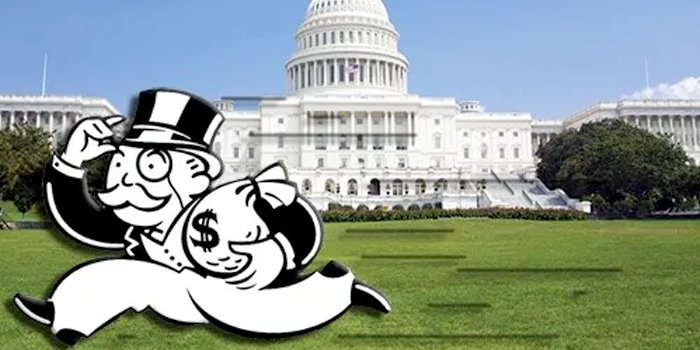
American billionaires have gotten $280 billion richer since the start of the COVID-19 pandemic
EDITOR'S NOTE: Now how the h#ll did THAT happen... go figure.. .rich get rich... almost like someone planned it... hold on... let me get my tin-foil. Don't look at all the bigwig CEOs that stepped down in March, because that had nothing to do with any of this.. really.
Though the coronavirus itself may not discriminate in terms of who can be infected, the COVID-19 pandemic is far from a great equalizer. In the same month that 22 million Americans lost their jobs, the American billionaire class’s total wealth increased about 10%—or $282 billion more than it was at the beginning of March. They now have a combined net worth of $3.229 trillion.
The initial stock market crash may have dented some net worths at first—for instance, that of Jeff Bezos, which dropped down to a mere $105 billion on March 12. But his riches have rebounded: As of April 15, his net worth has increased by $25 billion. Eric Yuan, founder and CEO of Zoom, was one of the few to see an increase in net worth even as the markets crashed, and he’s now up $2.58 billion.
These “pandemic profiteers,” as a new report from the Institute for Policy Studies, a progressive think tank, calls them, is just one piece of the wealth inequality puzzle in America. In the background is the fact that since 1980, the taxes paid by billionaires, measured as a percentage of their wealth, dropped 79%.
“We’re reading about benevolent billionaires sharing .0001% of their wealth with their fellow humans in this crisis, but in fact they’ve been rigging the tax rules to reduce their taxes for decades—money that could have been spent building a better public health infrastructure,” says Chuck Collins, director of the Program on Inequality and the Common Good at the Institute for Policy Studies and coauthor of the new report, titled “Billionaire Bonanza 2020: Wealth Windfalls, Tumbling Taxes, and Pandemic Profiteers.”
The Institute for Policy Studies put out its first Billionaire Bonanza report in 2015; since then, the report has continued to quantify the state of wealth inequality in the country, though each iteration may focus on different specifics (the 2018 report highlighted the issue of wealth dynasties). That this report could highlight billionaires profiting from the coronavirus pandemic was, in part, due to good timing. To compile the report, Collins and his coauthors refer to Forbes’s annual World’s Billionaire List, as well as daily trackers from both Forbes and Bloomberg.
Forbes has to pick when to take a snapshot of net worths for that list, and they picked March 18; the list then came out April 7. “We started to immediately look at it and realize, even three weeks later, the story was changing quickly,” Collins says. “Their story was, ‘Hey, the pandemic is really affecting even the billionaires; their wealth is down from last year globally and in terms of the U.S.’ What we found was, wait three weeks and they’ve now surpassed last year’s collective wealth and now they’re surging to new heights.”
This stark example of inequality in the time of a pandemic also serves to reiterate some points the institute has long been making about how deep these inequalities go and how far-reaching they really are. “Inequality is America’s pre-existing condition,” Collins says. “We went into this pandemic very polarized already, and unfortunately we don’t want to come out of it more polarized.” Another key finding of the report is that after the 2008 financial crisis, it took less than 30 months for billionaire wealth to return to its pre-meltdown levels. That wealth then quickly exceeded pre-2008 levels. But as of 2019, the middle class in America has not even yet recovered to the level of its 2007 net worth. “People went into the pandemic with the economic hangover from the Great Recession,” he says.
To solve the problem, the authors call for a Pandemic Profiteering Oversight Committee, a Corporate Transparency Act to discourage wealth hiding, and an emergency 10% Millionaire Income Surtax, among other actions.
Collins is particularly interested in the idea of a Charity Stimulus, which would help funnel the estimated $1.2 trillion sitting unused in private foundations, and another $120 million in donor-advised funds, to those actually in need. Private foundations are required to pay out just 5% each year, and that percentage can include overhead expenses; donor-advised funds have no such requirement, and thus no incentive to move money to charities on the ground.
“Wealthy donors have already taken the tax breaks and now the money is just sitting there. . . . If they’re saving the money for a rainy day, they should look out the window. It’s raining very hard,” he says. “It’s time to fulfill the second part of the promise. They got the tax break; now let’s move the money not to a donor-advised fund, not to foundation overhead to pay your kids—move the money to the active community charities that are solving problems right now who are fearful they’re going to have to close their doors.”
Some billionaires have made large donations during the pandemic, but Collins says we can’t let that philanthropy distract from the larger conversation of inequality. “Philanthropy is really not a substitute for a fair tax system and an adequately funded public safety net,” he says.
For the millions of Americans struggling to pay rent, buy groceries, and just trying to survive this pandemic, Collins notes that times of disaster do especially highlight the “unseemly underbelly of inequality.” But he also sees this time as somewhat of an awakening. “The good news is most people understand this. They actually support the public policies that would move us in the other direction,” he says, such as a wealth tax or progressive inheritance tax, or even a $15 minimum wage for grocery store employees and other workers. “Our politicians might catch up to where the general public is when it comes to addressing these inequalities.”
Read Original Article at fastcompany.com











